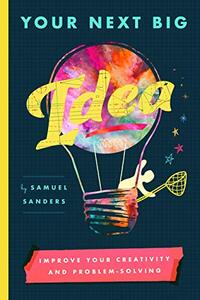Samuel Sanders Interview Published on: 21, Sep 2021
 Born and raised in the Northeast, what do you miss the most about your childhood?
Born and raised in the Northeast, what do you miss the most about your childhood?
I don’t think I really “miss” anything, but what I will say is that I am incredibly appreciative of the Northeast culture, which set me up for success. There is a “tough-go-getter attitude,” and plenty of opportunities to push yourself. It took me until I was an adult to realize it is ok to relax, but I would not be where I am today without that hard-work mentality.
What was your biggest dream as a child? Did it ever come true?As a young child, I wanted to be in the NBA, but I quickly realized that would not happen as I grew older. My second dream job was becoming an entrepreneur, which I did end up doing. Being an independent author is a lot like being an entrepreneur, and I am taking a lot of the skills that I had starting companies to the book marketing world, which has paid off.
Do you have any unique or quirky writing habits?I do what I call “chunk writing,” and I walk a lot. It is hard for me to sit and continually write for long periods. So what I do is I pick a chunk, say 2 pages, and I push through and write that. I then go on a 15-minute walk to think about what I wrote and what I should write next. The thinking time helps me map out my strategy moving forward as I continue through the book.
When and how did you decide that you wanted to be a professional writer?My inspiration came after noticing an omission in entrepreneurship education. When students learn about entrepreneurship, teachers refer to already successful companies, like Google or Apple, but rarely talk about how those founders developed and cultivated their ideas in the first place. This type of teaching does a disservice to students. It can lead to frustration as people ask questions like, “Why didn’t I think of that?” It can also lead to confusion and even damage a person’s creative confidence. Many who experience this omission wonder if they would ever be able to develop an innovative idea, permanently labeling themselves as “not creative.” I wanted to challenge the narrative around how we teach entrepreneurship by creating a nonfiction work that teaches readers how the top creatives and innovators develop ideas in the first place. He does this by taking a step back and examining the ideation process to serve as a foundation for entrepreneurial development.
How would you describe your experience of working for a company that was part of the INC 5000 fastest growing companies?It was eye-opening. When I was in business school, I had very traditional ideas about what a business could be and what it should look like. Working at Arcweb Technologies completely changed my perspective. There were no cubicles or conventional office setups. The office was meant to be fun and encourage creativity. Everyone’s voice and ideas were valued, whether you were the CEO or an intern. Meetings happened fast, and growth was always on everyone’s mind. It was not just about doing a job; it was about pushing the company as a whole to the next level. That type of culture helped shape my views on entrepreneurship and innovation.
Which is your favorite local coffee shop?I regularly switch up my coffee spot. However, I favor independent coffee shops. In Your Next Big Idea, I talk about the benefit of putting yourself in a new space. If I went to the same coffee shop every day and repeated that pattern, it would become routine, and routines hurt your creative ability. Putting myself in a new place every time allows me to be more detailed oriented. These new details I notice can inspire new ideas.
What is one question you wish you would get asked more? What would be your answer?I wish people asked me more about “problems.” Problems are the basis for any idea. We think of problems negatively, but in reality, each problem is an opportunity. If you can effectively solve a problem, then you have a potential business idea right there!
How much did you research while writing your novel, "Your Next Big Idea: Improve Your Creativity and Problem-Solving"?It wasn’t “conducting research” as much as reflecting on what I have just learned over the nine years I have been doing business. No one broke down how entrepreneurs, creatives, inventors, or innovators develop business ideas throughout my career. I wanted to provide a guide based on what I learned for those interested in learning those skills!
What are ways to avoid "information dumps" when writing the first chapter of a book?Think like a reader. For me, when I teach information, I map out the steps. Knowledge needs to be built on itself, so it starts with the question “What do I need to learn first?” and builds off from there. Once I have that skeleton of what I want to teach in what order, I give a very high-level overview. In the first chapter of nonfiction, you are trying to give a reader an idea of what they will learn and why they should learn it. Seeing the entire skeleton of the book’s main content can help you step back and figure out how to best give a small overview for the intro.
What is the one genre you feel you can never write? Why?Either Christian or Magna - I would just have no idea how to portray either of those genres with my background, skillset, and knowledge.
What's the best launch strategy for a web startup?The first step is identifying a problem that you can solve with your web startup. You won’t get any sales if you just go online and start a web store for a random item. Think about what you are providing and make sure you are giving the potential customer real value. There are plenty of places to start web stores and do online marketing. Think carefully about your marketing, however. Make sure you target an audience to who you are providing significant value. Then once you identify that target market, hyperfocus on those people and expand from there.
How many unfinished or unpublished books do you have? Do you think you'll be finishing/publishing any of these books in the near future?I have a couple of ideas I am simmering on right now, both fiction and nonfiction. However, I think they are a little bit away. In the meantime, I am publishing thought leadership articles for different news outlets. Feel free to follow along with my writing that way!
Which is the next book you are writing? What is it about?I have the 2nd edition of Your Next Big Idea with color and additional content. It is almost completed, so be on the lookout for that!
What do you like the most about AllAuthor? Do you have any suggestions for the website?I love how much care you put into helping independent authors. One suggestion would be for a program where new authors could talk to more experienced authors in a chat board or mentorship program.
Author of Your Next Big Idea, Samuel Sanders wanted to be in the NBA. His inspiration to become a writer came after noticing an omission in entrepreneurship education. He is an award-winning entrepreneur, member of the Nonfiction Authors Association, and the founder of Heard. He currently lives in Washington, D.C.


